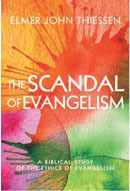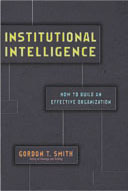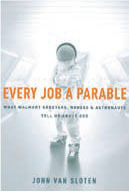The Scandal of Evangelism, by Elmer John Thiessen. Institutional Intelligence, by Gordon T. Smith. Every Job a Parable, by John Van Sloten. The Year of Less, by Cait Flanders. Art by Yisa Akinbolaji.
The Scandal of Evangelism: A Biblical Study of the Ethics of Evangelism

By Elmer John Thiessen
Wipf and Stock/Cascade, 2018. 274 pages. $38 (e-book $9.99, browse at Books.Google.ca)
SCANDALOUS, RUDE, disrespectful of differing beliefs, hate speech and inherently unethical – this, says Thiessen, is how much of Western society views evangelism. He is also concerned a growing number of Christians are themselves suspicious of evangelism due to misunderstanding and uncritically embracing tolerance – one of liberal society’s most cherished values.
In response Thiessen presents a robust, biblical and theological basis for an explicitly Christian ethics of evangelism. He contends it must involve the verbal proclamation of the gospel message.
Drawing mainly from the New Testament, Thiessen identifies 30 guidelines for ethical evangelism – "God-given norms that govern the proclamation of gospel." Thiessen prefers to speak of ethical guidelines rather than rules to avoid the twin dangers of falling into legalism or failing to account for context and circumstances.
Thiessen applies the guidelines in three contexts – evangelism of children, in the academy and in connection with humanitarian aid.
Careful readers will see why Thiessen prefers guidelines to rules as he walks us through the challenge of evangelizing a pluralistic culture. For example, he vigorously questions popular views of holistic ministry, believing Christian organizations are in danger of neglecting the gospel by failing to proclaim it in appropriate ways.
Along with an excellent discussion of proselytism, both from a historical and contemporary perspective, Thiessen concludes with a series of concerns he has with the current health of evangelism within the Christian community.
As a faithful Christian with a lifetime of teaching, speaking and writing in the fields of philosophy and religious studies, Thiessen is well equipped to write this much-needed defence of ethical evangelism.
This is a critically important book for pastors, leaders and other Christians who feel uneasy about the ethics of sharing their faith with neighbours, friends and coworkers. –DAVID DANIELS
Institutional Intelligence: How to Build an Effective Organization

By Gordon T. Smith
InterVarsity/IVP Academic, 2017. 224 pages. $21 (e-book $15, browse at Books.Google.ca)
INSTITUTIONS ARE part of what it means to be human. We depend on them. But what does it mean to think theologically about nonprofit institutions? Do they have a vocation to fulfill?
Gordon Smith, president and professor of theology at Ambrose University in Calgary, contends we are at our best when we understand how institutions work and how each of us can help those that matter most to us to flourish. We need effective organizations to thrive in.
An anti-institutional mindset is self-defeating. Despite the bad press about institutions, they do matter. Smith identifies key elements or features of building effective and dynamic institutions. "Neglecting any one of these seven will cripple an institution."
Mission clarity is paramount. What are specific organizations "called to do, at this time and place, within this economic, social, political demographic"? Appropriate governance structures allow organizations to deliver on their stated mission. Institutions require quality personnel positioned to fulfill the mission. Institutions must be marked by hopeful realism, cultivating "a culture that is consistent with their organizational ethos and mission." There must be a symbiotic relationship between finances and mission. And institutions require built space, marked by identity, purpose and community.
Words like independence, autonomy and self-sufficiency should not be applied to institutions – the operative phrase is dependent entities.
This resource actually reviews institutions to determine what is and is not working, and why. It speaks to a broad readership. Church, college, seminary and nonprofit leaders especially will profit from the wealth of practical insight into the composition of institutions, which are indeed worth the investment of time and effort. –BURTON K. JANES
Every Job a Parable: What Walmart Greeters, Nurses and Astronauts Tell Us About God

By John Van Sloten
NavPress, 2017. 240 pages. $21 (e-book $9.99, audiobook $14.58, audio CD $12.82, browse at Books.Google.ca)
CALGARY PASTOR John Van Sloten has reassembled five years of sermons on various vocations into an appealing book. "When Jesus wrapped a parable around a specific vocation, he was affirming the creational goodness of that job," Van Sloten believes. And Jesus is "doing the same today – through the parable that is your job." In our respective jobs we image God, revealing something of His character and work through ours.
In each chapter Van Sloten seeks to understand vocations as revelations of what God is like. An electrician’s physical act of wiring, for example, becomes an "embodied liturgy – a ritualized re-enactment of a God who connects … who brings his power in a safe, at-just-the-right-angle, craftsmanlike way."
Every chapter concludes with "spiritual practices (a lectio vocatio) that will teach you how to read your job" in more discerning, enabling ways. These practices demand prayerful thought and action even after the book returns to the shelf, though the author might have explained how lectio vocatio connects to other probing traditions like lectio divina.
Van Sloten’s book is revitalizing, though not without problems. He is so focused on today’s vocational parables that he appears selective in his use of Jesus’ own parables and other Scriptures, almost to the extent of proof texting.
And while he’s entitled to choose which vocations best suit his message, he offers few words on homemaking, and none on bivocational work. A chapter on those who prefer to (or must) split their vocational roles would have offered exemplary responses to Van Sloten’s soul-arresting questions (e.g., "What does what you do best say about who God is?").
This book got me thinking, as a theologian, adoptive father and homemaker/do-it-yourselfer, about how my own responses are (in an image of God’s mercies) new every morning. –MATTHEW FORREST LOWE
Canadian creatives

Strong and Free, 40″ by 40″ (acrylic and mixed media on canvas) by Yisa Akinbolaji, www.yisagallery.com PAINTING © YISA AKINBOLAJI
"Before the Remoglue (removable glue) is removed from the topmost layer of my paintings, the beauty and messages beneath the surface might only be imagined. Though at the start of each painting one cannot see much due to the temporary covering, once the barrier is removed the full value is permanently open and appreciated. Therefore the outcome of my art technique metaphorically conveys the value of freedom. Faith and hope are worthy treasures for humans to possess. Once we have them, they will make us strong and free."